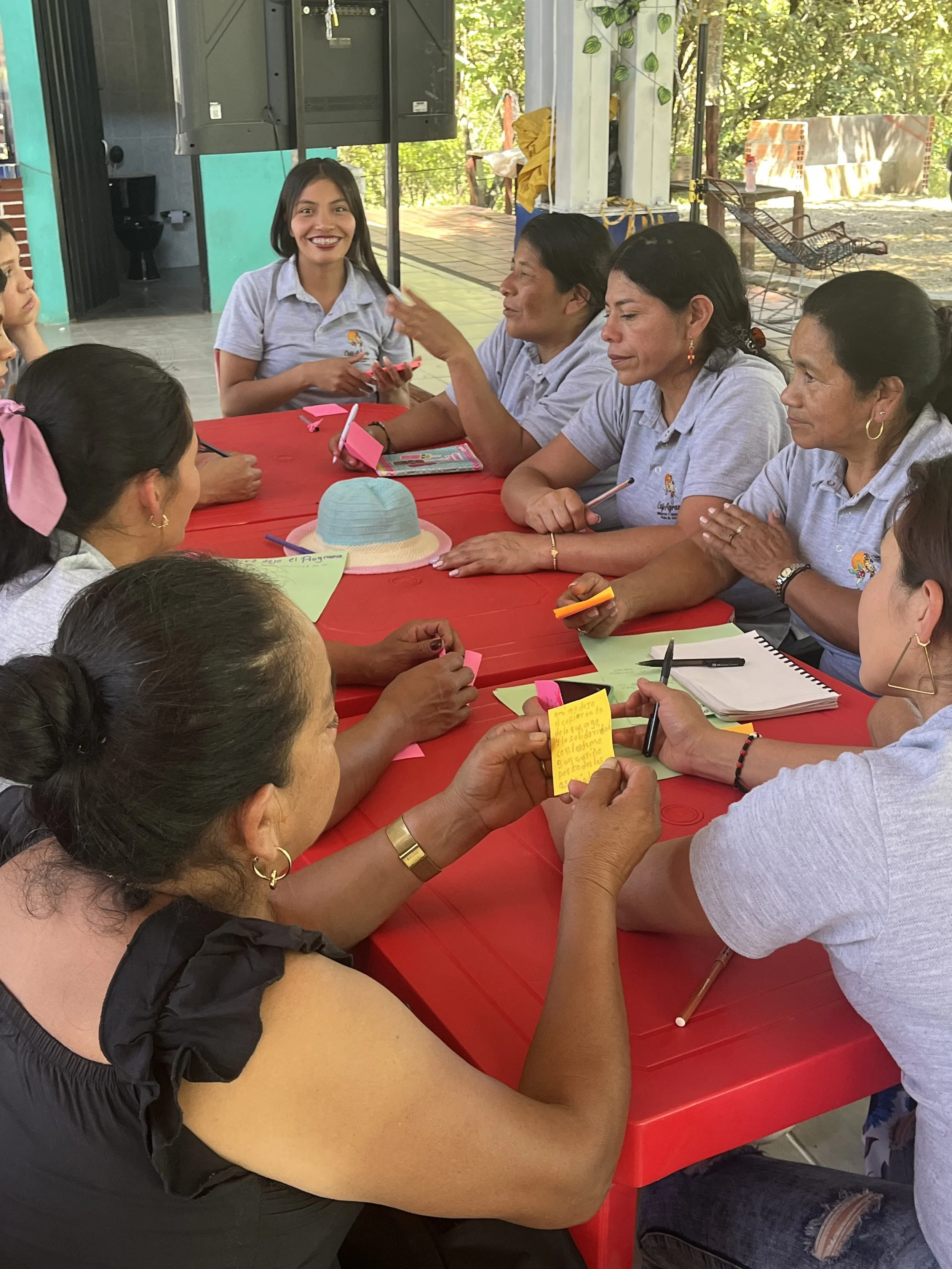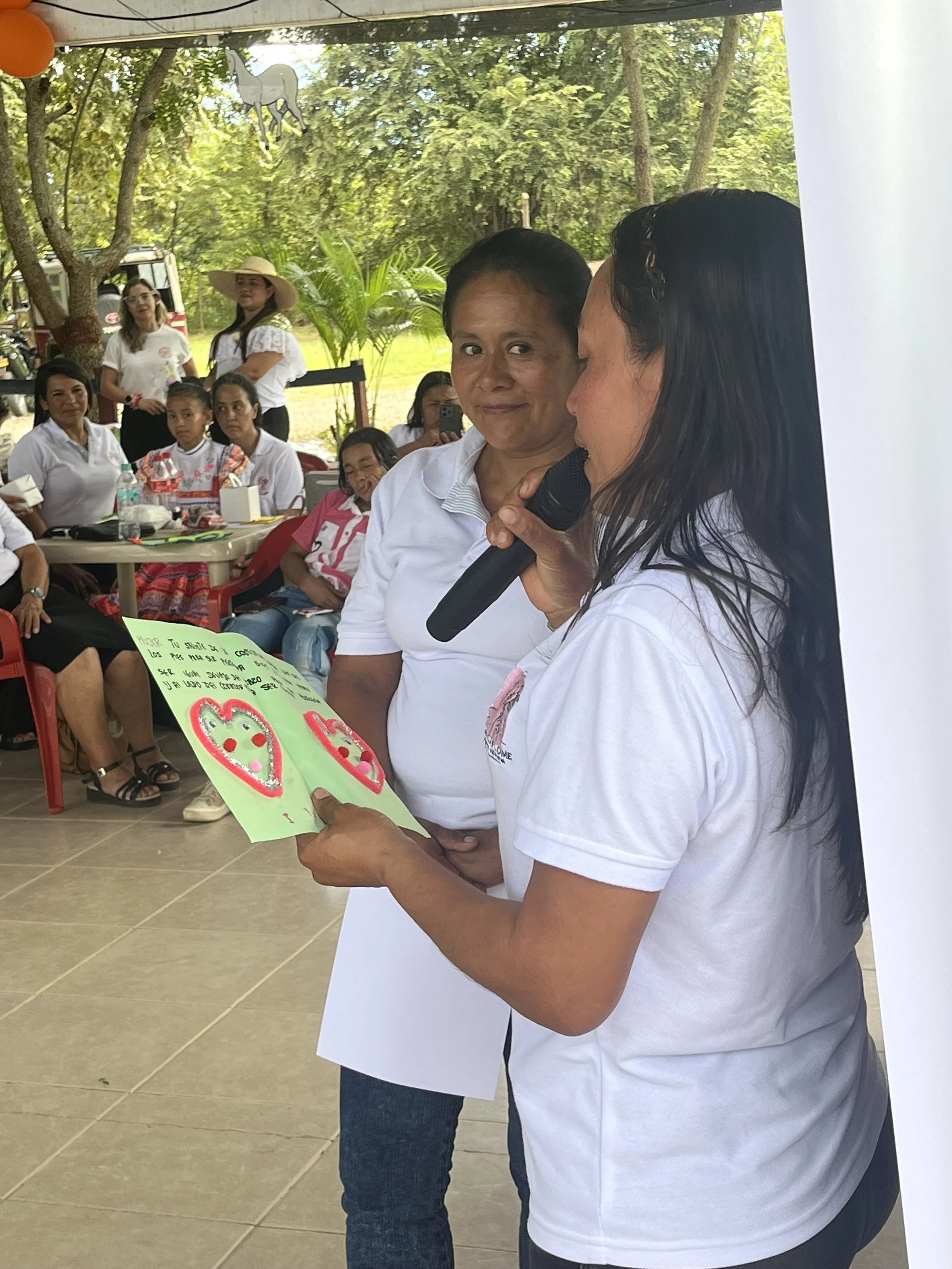A Reflection from Colombia: Farmer School Pilot Program 2024-25
At the end of June 2025, our team traveled to Colombia for a Monitoring and Evaluation trip to learn from our first Farmer School pilot program. Launched in May 2024, this pilot was developed in partnership with Siruma Coffee and supported by Coffee Circle’s Coffee Vision Fund.
Together, we worked with two women’s associations in Tolima — AMUCAFLOME and Café Agrario — offering training in gender equity, income diversification, and business practices, along with seed capital to support the launch of local coffee purchasing points.
Over the course of a year, we collaborated with 50 women to help bring their collective vision to life. As we planned the trip, we had three goals in mind:
Understand the impact of the pilot program with the two associations;
Evaluate the effectiveness of our affiliate model;
Explore opportunities to expand Farmer School to new communities for our 2026 cohort.
A Year in Tolima: What We Did
Our pilot program launched in May 2024 in partnership with Siruma Coffee and the two women-led associations — AMUCAFLOME and Café Agrario — within their supply chain. After our first diagnostic visit in May, we returned twice more to host in-person bootcamps — first in August, then in November.
In October, eight representatives from the associations attended the Women-Powered Coffee Summit in Veracruz, Mexico. They returned energized and inspired, sharing their learnings widely within their communities.
Alongside these in-person engagements, producers participated in virtual webinars and workbook-based learning, supported by the Siruma team, which was especially important given the limited internet access in the region.
The program consisted of:
Training in gender equity, community leadership, business planning, food security, budgeting, and finance
A peer exchange program that brought eight producers to the Women-Powered Coffee Summit in Mexico
Seed funding of approximately $4,200 USD to each of the associations to launch their action plans, including purchasing center equipment to evaluate coffee quality and improve market access
Roses: What Worked Well
During our visit, we met with 50 women producers to hear their reflections. The visit was structured in two parts:
First, we held focus groups with each association to discuss the impact of the seed capital and their experience developing the project. Then, we brought both associations together for a larger conversation to explore what worked, what didn’t, and what could be improved for the Farmer School Program overall.
Importantly, these spaces were also open to male community members, especially relevant in Cafe Agrario’s case, which has both male and female members, where male members played key roles in launching the purchasing center and quality lab.
We used interactive activities to guide the discussion, asking questions such as: What was your favorite part of the program? What are you most proud of? How have you changed?
When asked what they enjoyed most, one response echoed across the room: the gender workshop.
“It helped me hear my own voice again,” one participant shared.
These workshops weren’t just about terminology or theory — they created space for women to reconnect with themselves. Amid daily responsibilities, especially in contexts where women’s labor is undervalued, that kind of space is rare and powerful.
Another participant added:
“I realized that I’m a coffee farmer too. I’m not just someone helping my husband pursue his dream. My dream matters, and we can build it together.”
The reflective journaling activities also resonated. One participant spoke about the childhood dreams activity:
“I remembered how many dreams I had as a little girl. Over time, I set them aside to focus on my family’s dreams, and eventually forgot that I had those dreams. But now I know — mine matter too. And we can achieve them all, together.”
The fact that bootcamps were hosted jointly with another association was another highlight. Although both groups are based in Tolima (about 1 hour from each other), they had few opportunities to connect before. After traveling internationally together for the Women Powered Coffee Summit, and forming deeper bonds, they are now planning collaborative initiatives such as co-hosting future workshops and opening their spaces to one another for community learning.
What Do the Husbands Think?
True transformation happens at every level, including at home.
We spoke with several husbands and male family members who came to celebrate their partners’ graduation and asked: What changes have you seen?
One husband shared:
“Before, I felt like I was fighting this long, hard battle alone. I wanted to protect my wife from the burden. But now? I’ve gained my greatest ally. She’s my boss at the beneficio. Now we plan together, split roles, and we know we can go further.”
In a region where machismo culture is still deeply rooted, hearing this was powerful. While support from husbands often exists in practice, true partnership is still rare. This was one of the first times I had heard it voiced so clearly, and it affirmed that the program is fostering real transformation for both women and men.
What Did We Learn from the Pilot Program?
Individual Project vs. Collective Project:
In most of our work so far, the Farmer School has supported individual producers and families in implementing their vision projects. Aside from a few exceptions in Costa Rica, most projects have remained at the individual level, even when facilitated through associations or cooperatives.
This pilot showed us the potential of implementing the Farmer School at the association/collective level. Beyond the benefits of scale, it created space for male members to be included meaningfully, while preserving safe and inclusive learning environments for women. Involving men early on, particularly in gender workshops, opened new possibilities for broader community transformation.
We also saw that strong leadership within the associations was key to success. In both groups, the leaders played a critical role in assigning roles, building action plans, and ensuring smooth implementation. Their leadership truly made the difference.
Workbook (asynchronous vs. synchronous touchpoints):
Farmer School consists of 2–3 bootcamps — immersive, in-person gatherings lasting over two days, focused on hands-on learning. Between bootcamps, we facilitate masterclasses (virtual or in-person) and weekly touchpoints to keep participants engaged with the material.In Colombia, we learned early that most producers lack stable internet connections for WhatsApp or Zoom, platforms we commonly use in Costa Rica and Mexico. As a result, we used physical workbooks instead of digital check-ins. These workbooks included reflective questions and journaling activities scheduled weekly. While this limited real-time feedback, the format enabled deeper personal reflection, supported by strong local coordination from Siruma’s regional lead.
Many participants mentioned the workbook’s reflective questions as the moment that helped them understand their role as coffee producers, identify learning goals, and recognize knowledge gaps.
Affiliate Model — Maximum Impact within Partners’ Supply Chain:
This pilot marked a new step for Bean Voyage: working in a new country with existing supply chains, where producers sell coffee to the existing supply chain of our affiliate partner, not through our direct network. This allowed us to focus fully on training impact while supporting broader income-generating potential for farmers. Especially when the values are aligned, this model can have a great impact potential.
Looking Ahead
We are currently analyzing data and feedback collected throughout the year and will publish our project report in August 2025. We can’t wait to return to Colombia to continue building on this momentum, deepening our collaboration with Siruma and expanding our reach with coffee producers across their network and beyond.
During this trip, we also visited two potential cooperatives in Caldas, part of Siruma’s supply chain. With these cooperatives and their women members, we hosted activities focused on understanding their needs, mapping current stakeholders and roles, and identifying impact areas for Bean Voyage’s work. We aim to deepen collaboration with Siruma and partners in 2026.
During graduation, each participant made a gift for each other and shared it with one another.
“What do I, as a coffee producer, commit to do with what I have learned from the program?”
Interested in supporting Farmer School’s next phase in Colombia? We’d love to hear from you!
hello@beanvoyage.org
Written by Sunghee Tark, Co-Founder, Bean Voyage
Photos: Sunghee Tark
July 2025






